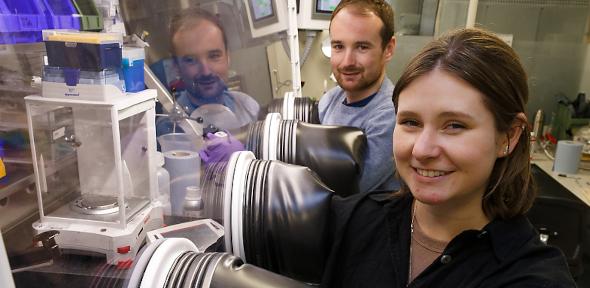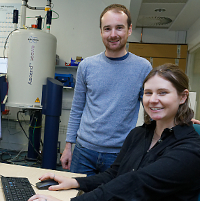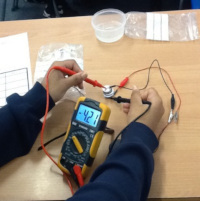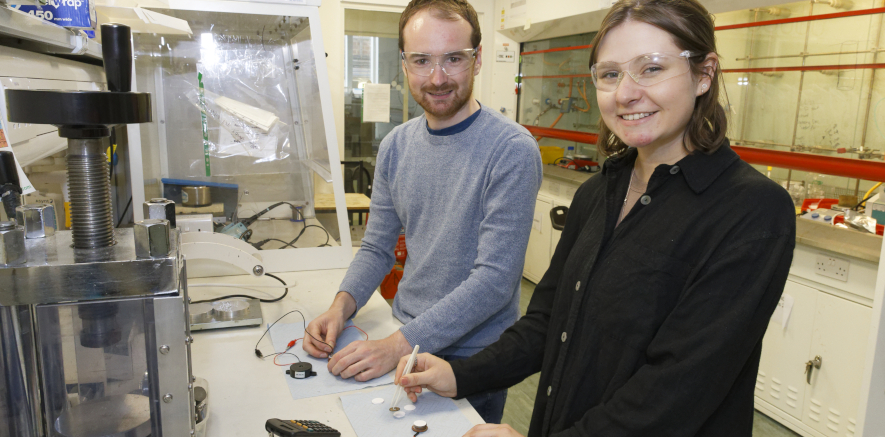
Megan Penrod and Dr Darren Ould (above) are helping to lead the Grey group's outreach activities.
When Professor Clare Grey won the Körber European Science Prize in 2021, the award included an unexpected bonus - funds for outreach activities.
So at their retreat in 2022, group members discussed how to make the most of this opportunity. Both Megan Penrod and Dr Darren Ould had been involved in volunteering and outreach before, and found themselves at the forefront of the discussion.
 When Megan was studying for her BSc in Materials Science and Engineering at Penn State University, she was involved in the university’s student-led philanthropy programme THON, a 48-hour dance marathon which raises money to fight childhood cancer. Megan joined the Grey group as a research assistant in 2021, and has been researching the thermal degradation of lithium nickel oxide in battery cathodes as part of the Faraday Institution battery programme. She will start her MPhil with the Grey group in October.
When Megan was studying for her BSc in Materials Science and Engineering at Penn State University, she was involved in the university’s student-led philanthropy programme THON, a 48-hour dance marathon which raises money to fight childhood cancer. Megan joined the Grey group as a research assistant in 2021, and has been researching the thermal degradation of lithium nickel oxide in battery cathodes as part of the Faraday Institution battery programme. She will start her MPhil with the Grey group in October.
Darren is a postdoc in the Grey and Wright groups and is researching sodium ion batteries as part of the Faraday Institution’s initiative in this area. During his PhD at Cardiff University, Darren took part in many outreach and engagement events, which included leading hands-on practical science classes in deprived areas in the South Wales Valleys and hosting museum activities in Swansea and Cardiff. He enjoyed the outreach there and wanted to stay involved.
"We didn't realise we were going to be the ones to lead it!"
“So it seemed natural to help guide the discussion about outreach,” recalls Megan. “But we didn’t realise that we were going to be the ones to lead it!”
After returning from the retreat, Darren and Megan started planning. They wanted to focus on primary school children. “Children at that age aren’t sure yet what they want to do,” explains Megan, “so we felt this is a good time to get them interested in science.”
“I think outreach is very important to help children. As a young girl I liked science, but it’s always nice to see someone come in and support your interest; especially as a girl it’s nice to see someone who looks like you.”
Build a battery
 Darren and Megan’s new activity is called 'Build a Battery.' Megan explains: “The idea is that you can construct batteries from 1p coins and aluminium foil, and you use vinegar, lemon juice and salt water as electrolytes. The kids build the batteries, then use them to power up a calculator and a buzzer. They get to measure the voltage with a voltmeter and decide which electrolytes work better and how many cells each item needs.”
Darren and Megan’s new activity is called 'Build a Battery.' Megan explains: “The idea is that you can construct batteries from 1p coins and aluminium foil, and you use vinegar, lemon juice and salt water as electrolytes. The kids build the batteries, then use them to power up a calculator and a buzzer. They get to measure the voltage with a voltmeter and decide which electrolytes work better and how many cells each item needs.”
Before putting the plan into action, Megan and Darren sense-checked it with several postdocs in the group who tried it on their children. They also looked at the National Curriculum to see what level they should be aiming at. “One of the hardest parts was knowing what the kids would and wouldn’t understand and what level to gauge it at,” explains Megan. “We also needed to make sure the experiment worked consistently. We didn’t want a roomful of disappointed children!” Megan and Darren also discovered that one of the things that most excites the children is being able to wear lab coats and goggles when they do the experiments “so they feel like a scientist.”
Darren and Megan lead a team of Grey group members who have already visited three schools, and have two more planned for the summer term. They also organised several hands-on activities at the department’s Open Day in March.
“We are taking it slow at the moment because we are still developing the activities,” says Darren. “Our theory is ‘don’t run before you walk.’ We also want to establish it so that when we eventually leave, we can pass it down to further members of the group,” says Megan.
Looking ahead
Having said this, Megan and Darren are already looking forward to hosting activities at the Faraday Institute Science Conference in Birmingham in September and the New Scientist Live Festival at ExCel London in October.
Megan says she enjoys the outreach very much. “It also helps you expand your ability to communicate about science.”
Darren agrees: “Personally speaking, it’s fun, and it’s rewarding working with the children. It’s also good for personal and professional development, because it widens your ability to communicate complex ideas in a simple way. I’m definitely a better communicator, having done outreach.”


